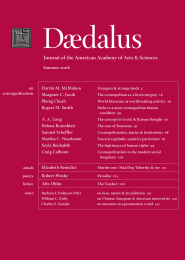Rousseau, the anticosmopolitan?
A complex and paradoxical thinker, Rousseau has rightly been called “the great wrecker of theories and categories.”1 This description is particularly fitting when it comes to cosmopolitanism, an ideal and a constellation of values that he repeatedly denounced. On this issue, as on so many others, Rousseau was both a philosophe and an antiphilosophe; his was a critique of the Enlightenment from within.2 Rousseau attacked cosmopolitanism not because he did not espouse the humanitarian principles it was supposed to promote, but because he thought it was a sham.
Setting himself up as the moral conscience of his age, Rousseau reminded his readers that manners and morals are not the same thing. Curiosity or ‘openness’ toward others, the willingness to do business with them, and even the eagerness to socialize with them should not be confused with accepting them as one’s social and political equals. As Rousseau pointed out, cosmopolitanism could, and did, easily coexist with, and lend support to, unjust political and social regimes. In rejecting cosmopolitanism, Rousseau held up a mirror to the elites of his time. He denounced what he thought were their superficial and self-congratulatory attitudes. He revealed how unnatural, vain, and even corrupting their ‘civilized’ values were. With all their celebrated hospitality toward strangers and inquisitiveness about foreigners, cosmopolitan philosophes were neglecting a simple moral imperative: “The essential thing is to be good to the people with whom one lives.”3
. . .
Endnotes
- 1Arthur M. Melzer, The Natural Goodness of Man: On the System of Rousseau’s Thought (Chicago: The University of Chicago Press, 1990), 283.
- 2Mark Hulliung, The Autocritique of Enlightenment: Rousseau and the Philosophes (Cambridge, Mass.: Harvard University Press, 1994).
- 3Unless otherwise indicated, all quotations from Rousseau are from his Oeuvres complètes, ed. Bernard Gagnebin and Marcel Raymond (Paris: Gallimard, Bibliothèque de la Pléiade, 1959–1995). (Henceforth, OC.) Translations are my own. This quotation is from Emile, OC, vol. IV, 249.
